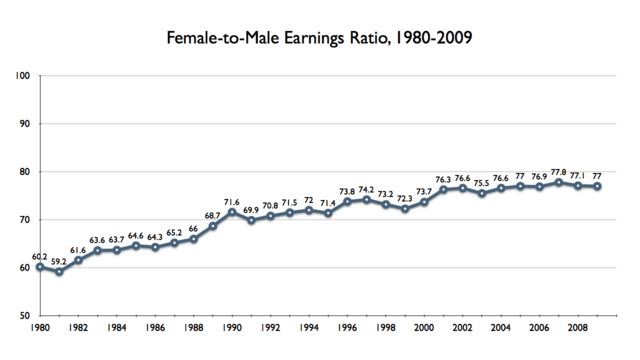Bill set to be considered this week would try to address gender gap in wages
A graph showing the gender wage gap in the United States. Statistics indicate women make about 80 cents for every dollar their male counterparts make. (Photo from Sonicyouth86 via Wikimedia Commons.)
Later this week, Congress will vote on the Paycheck Fairness Act. The legislation would expand upon the Equal Pay Act of 1963, but is not expected to pass.
The Paycheck Fairness Act is an attempt to address the persistent gender wage gap. According to the Institute for Women’s Policy Research (IWPR), women earn, on average, 80 cents for every dollar their male counterparts earn. While many companies discourage, or even forbid, discussing salaries with fellow employees, Irin Carmon, a staff writer at Salon, suggested ignoring company policy in these instances.
“I’m not saying you should announce all competitive information to the world, but there’s a lot of evidence that what is left of the pay gap … starts from the very first salary,” she said. “It’s a combination of discrimination and also women are asking for less, most likely. If men are already socialized to ask for more and to negotiate harder, part of that probably comes out of the fact that women don’t even to know what to ask for, so I think pay transparency, or at this point pay secrecy, is really only benefitting either managers or people who really think they’re worth a lot.”
Carmon said that often women don’t know of pay discrimination in their workplace because they cannot discuss salaries. Terri Kelly, a sales representative with a pharmaceutical company, only found out about her unequal pay after she married a man with the same position in her company. She found out that she made $12,000 less a year than her new husband did.
“I think both of our reactions were very surprised that, in this day in age, that it was blatant that they were paying him more,” Kelly said. “We’re not talking about five dollars difference. We’re talking about thousands of dollars for doing the same job.”
According to the IWPR, 23 percent of large firms, with 100 employees or more, prevent discussion of salaries. Carmon believes that allowing employees to openly discuss salaries would force employers to explain any disparities.
Critics of the Paycheck Fairness Act have argued it’s a “jobs killer” and that too many lawsuits would arise as a result of it passing. The United States Chamber of Commerce has urged the Senate to vote against the act.
Carmon argued that few pay discrimination claims even go to trial. She also said the act would not force employers to pay equal salaries to women in instances in which their male counterparts may be more qualified.
“And also, The Paycheck Fairness Act would actually just make companies have to explain why someone was paid more. It would just, basically, make them explain the process, so that doesn’t necessarily mean that all of the sudden the wage gap is going to be paid out through these massive settlements. It just, basically, allows it to even open up the door so that if women are being discriminated against, they would even begin to know,” Carmon said.
